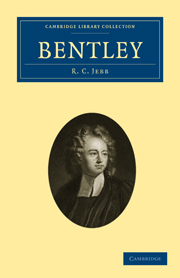Book contents
- Frontmatter
- PREFATORY NOTE
- Contents
- CHAPTER I EARLY LIFE. THE LETTER TO MILL
- CHAPTER II THE BOYLE LECTURES
- CHAPTER III LEARNED CORRESPONDENCE. THE KING'S LIBRARIAN
- CHAPTER IV THE CONTROVERSY ON THE LETTERS OF PHALARIS
- CHAPTER V BENTLEY'S DISSERTATION
- CHAPTER VI TRINITY COLLEGE, CAMBRIDGE
- CHAPTER VII BENTLEY AS MASTER OF TRINITY
- CHAPTER VIII LITERARY WORK AFTER 1700.—HORACE
- CHAPTER IX OTHER CLASSICAL STUDIES. — TERENCE. — MANILIUS. — HOMER
- CHAPTER X THE PROPOSED EDITION OF THE NEW TESTAMENT
- CHAPTER XI ENGLISH STYLE. EDITION OF PARADISE LOST
- CHAPTER XII DOMESTIC LIFE. LAST YEARS
- CHAPTER XIII BENTLEY'S PLACE IN THE HISTORY OF SCHOLARSHIP
CHAPTER III - LEARNED CORRESPONDENCE. THE KING'S LIBRARIAN
Published online by Cambridge University Press: 07 September 2010
- Frontmatter
- PREFATORY NOTE
- Contents
- CHAPTER I EARLY LIFE. THE LETTER TO MILL
- CHAPTER II THE BOYLE LECTURES
- CHAPTER III LEARNED CORRESPONDENCE. THE KING'S LIBRARIAN
- CHAPTER IV THE CONTROVERSY ON THE LETTERS OF PHALARIS
- CHAPTER V BENTLEY'S DISSERTATION
- CHAPTER VI TRINITY COLLEGE, CAMBRIDGE
- CHAPTER VII BENTLEY AS MASTER OF TRINITY
- CHAPTER VIII LITERARY WORK AFTER 1700.—HORACE
- CHAPTER IX OTHER CLASSICAL STUDIES. — TERENCE. — MANILIUS. — HOMER
- CHAPTER X THE PROPOSED EDITION OF THE NEW TESTAMENT
- CHAPTER XI ENGLISH STYLE. EDITION OF PARADISE LOST
- CHAPTER XII DOMESTIC LIFE. LAST YEARS
- CHAPTER XIII BENTLEY'S PLACE IN THE HISTORY OF SCHOLARSHIP
Summary
In 1692—the year of his first Boyle Lecturership—an accident placed Bentley in correspondence with John George Graevius, a German who held a professorship at Utrecht, and stood in the front rank of classical— especially Latin—scholarship. When Bentley was seeking materials for an edition of Manilius, he received a box of papers from Sir Edward Sherburn, an old cavalier who had partly translated the poet. The papers in the box, bought at Antwerp, had belonged to the Dutch scholar, Gaspar Gevärts. Among them was a Latin tract by Albert Rubens (‘Rubenius’), the author of another treatise which Graevius had previously edited. Bentley, with Sherburn's leave, sent the newly-found tract to Graevius, who published it in 1694, with a dedication to Bentley. This circumstance afterwards brought on Bentley the absurd charge of having intercepted an honour due to Sherburn.
Graevius was rejoiced to open a correspondence with the author of the Letter to Mill, which he had warmly admired. The professor's son had lately died, leaving an unpublished edition of the Greek poet Callimachus, which Graevius was now preparing to edit. He applied to Bentley for any literary aid that he could give. In reply, Bentley undertook to eollect the fragments of Callimachus, scattered up and down throughout Greek literature; remarking that he could promise to double the number printed in a recent Paris edition, and also to improve the text. In 1696 Bentley fulfilled this promise by sending to Graevius a collection of about 420 fragments; also a new recension of the poet's epigrams, with additions to their number from a fresh manuscript source, and with some notes on the hymns.
- Type
- Chapter
- Information
- Bentley , pp. 33 - 39Publisher: Cambridge University PressPrint publication year: 2010First published in: 1882



